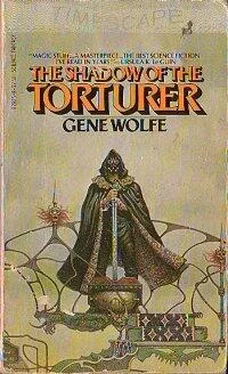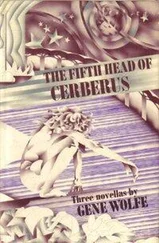Row, brothers, row!
The current is against us.
Row, brothers, row!
Yet God is for us.
Row, brothers, row!
The wind is against us.
Row, brothers, row!
Yet God is for us.
And so on. Even when the lamps were no more than sparks a league or more upriver, the sound came on the wind. As I was later to see, they pull the shaft with the refrain, and put it back again with the alternate phrases, and so make their way watch upon watch.
When it seemed that it must soon be day, I saw upon the broad, black ribbon of the river a line of sparks that were not the lights of vessels but fixed fires stretching from bank to bank. It was a bridge, and after tramping long through the dark I reached it. Leaving the lapping tongues of the river, I mounted a flight of broken steps from the Water Way to the more elevated street of the bridge, and at once found myself an actor in a new’ scene. The bridge was as well lighted as the Water Way had been shadowed. There were flambeaux on staggering poles every ten strides or so, and at intervals of about a hundred strides, bartizans whose guardroom windows glared like fireworks clung to the bridge piers. Carriages with lanterns rattled along, and most of the people who thronged the walkway were accompanied by linkboys or carried lights themselves. There were vendors who shouted the wares they displayed in trays hung from their necks, externs who gabbled in rude tongues, and beggars who showed their sores, feigned to play flageolets and ophicleides, and pinched their children to make them weep.
I confess I was much interested by all this, though my training prohibited me from gawking at it. With my hood drawn well over my head, and my eyes resolutely to the front, I passed among the crowd as if indifferent to it; but for a short time at least I felt my fatigue melt away, and my strides were, I think, the longer and swifter because I wanted to remain where I was. The guards in the bartizans were not city roundsmen but peltasts in half-armor, bearing transparent shields. I was almost at the western bank when two stepped forward to bar my way with their blazing spears. “It is a serious crime to wear the costume you affect. If you intend some jape or artifice, you endanger yourself for its sake.”
I said, “I am entitled to the habit of my guild.”
“You seriously claim you are a carnifex, then? Is that a sword you carry?”
“It is, but I am no such thing. I am a journeyman of the Order of the Seekers for Truth and Penitence.”
There was a silence. A hundred people or so had surrounded us in the few moments required for them to ask, and me to answer, their question. I saw the peltast who had not spoken glance at the other as if to say he means it, and then at the crowd.
“Come inside. The lochage wishes to speak with you.” They waited while I preceded them through the narrow door. The interior boasted only one small room, with a table and a few chairs. I mounted a little stair much worn by booted feet. In the room above, a man in a cuirass was writing at a high desk. My captors had followed me up, and when we stood before him, the one who had spoken previously said, “This is the man.”
“I am aware of that,” the lochage answered without looking up.
“He calls himself a journeyman of the guild of torturers.” For a moment the quill, which had skated along steadily before, paused. “I had never thought to encounter such a thing outside the pages of some book, but I dare say he speaks no more than the truth.”
“Ought we to release him then?” the soldier asked.
“Not quite yet.”
Now the lochage wiped his quill, sanded the letter over which he had labored, and looked up at us. I said, “Your subordinates stopped me because they doubted my right to the cloak I wear.”
“They stopped you because I ordered it, and I ordered it because you were creating a disturbance, according to the report of the eastern turrets. If you are of the guild of torturers—which to be honest I had supposed reformed out of existence long ago—you have spent your life in the—What do you call it?”
“The Matachin Tower.”
He snapped his fingers, and looked as though he were both amused and chagrined.
“I mean the place where your tower stands.”
“The Citadel.”
“Yes, the Old Citadel. It’s east of the river, as I recall, and just at the northern edge of the Algedonic Quarter. I was taken there to see the Donjon when I was a cadet. How often have you gone out into the city?” I thought of our swimming expeditions and said, “Often.”
“Dressed as you are now?”
I shook my head.
“If you’re going to do that, pull back that hood. I can only see the tip of your nose wiggle.” The lochage slid from his stool and strode to a window overlooking the bridge. “How many people do you think there are in Nessus?”
“I have no idea.”
“No more do I, Torturer. No more does anyone. Every attempt to count them has failed, as has every attempt to tax them systematically. The city grows and changes every night, like writing chalked on a wall. Houses are built in the streets by clever people who take up the cobbles in the dark and claim the ground—did you know that? The exultant Talarican, whose madness manifested itself as a consuming interest in the lowest aspects of human existence, claimed that the persons who live by devouring the garbage of others number two gross thousands. That there are ten thousand begging acrobats, of whom nearly half are women. That if a pauper were to leap from the parapet of this bridge each time we draw breath, we should live forever, because the city breeds and breaks men faster than we respire. Among such a throng, there is no alternative to peace. Disturbances cannot be tolerated, because disturbances cannot be extinguished.
Do you follow me?”
“There is the alternative of order. But yes, until that is achieved, I understand.”
The lochage sighed and turned to face me. “If you understand that at least, good. It will be necessary, then, for you to obtain more conventional clothing.”
“I cannot return to the Citadel.”
“Then get out of sight tonight and buy something tomorrow. Have you funds?”
“A trifle, yes.”
“Good. Buy something. Or steal, or strip the clothes from the next unfortunate you shorten with that thing. I’d have one of my fellows take you to an inn, but that would mean more staring and whispering still. There’s been some kind of trouble on the river, and they’re telling each other too many ghost stories out there already. Now the wind’s dying and a fog’s coming in—that will make it worse. Where are you going?”
“I am appointed to the town of Thrax.”
The peltast who had spoken before said, “Do you believe him, Lochage? He’s shown no proof that he’s what he claims.”
The lochage was looking out the window again, and now I too saw the threads of ochre mist. “If you can’t use your head, use your nose,” he said. “What odors entered with him?”
The peltast smiled uncertainly.
“Rusting iron, cold sweat, putrescent blood. An impostor would smell of new cloth, or rags picked from a trunk. If you don’t wake to your business soon, Petronax, you’ll be north fighting the Ascians.”
The peltast said, “But Lochage—” shooting such a look of hatred toward me that I thought he might attempt to do me some harm when I left the bartizan. “Show this fellow you are indeed of the torturers’ guild.” The peltast was relaxed, so there was no great difficulty. I knocked his shield aside with my right arm, putting my left foot on his right to pin him while I crushed that nerve in the neck that induces convulsions.
The city at the western end of the bridge was very different from the one I had left. At first there were flambeaux at the corners, and nearly as much coming and going of coaches and drays as there had been on the bridge itself. Before quitting the bartizan, I had asked the lochage’s advice about a place to spend what remained of the night; now, feeling the fatigue that had deserted me only briefly, I plodded along watching for the inn sign.
Читать дальше










